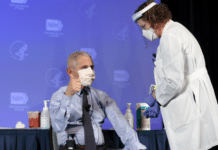
Physicians and nurses are the primary face of the health system for patients. We all want our physicians to be happy, to not be stressed and to be fully attentive to the work they are doing. Part of that job satisfaction is compensation.
The average physician spent a lot of time getting to the point where they could practice and ran up debt in doing so. They typically work long hours and deal with emotional and difficult health issues, so being well paid seems fair. At the same time, what we pay doctors compared to other countries is one of the reasons we have very high health spending. A recent report from Medscape looks at recent trends in physician compensation. (Medscape Report)
Overall, in 2023 physician compensation was about 3% higher than in 2022, with primary care doctors seeing a slightly larger increase than specialists, although specialists typically earn around 40% more than a primary care physician. Average pay for all doctors was $363,000 in 2023 versus $352,000 in 2022. Not much to complain about, really. Primary care physician pay averaged $277,000 compared to $394,000 for specialists. I see this gap as unwarranted in terms of value to the system and to patients. Good primary care keeps you healthy and limits unnecessary costs, but specialists train for longer and deal with more complex issues, which is reflected in their pay.
The highest paying specialties were orthopedics, an average of $558,000; plastic surgery (which is largely fee for service), $536,000; cardiology, $525,000 and urology, $515,000. At the lower end it is mostly primary care, although diabetologists/endocrinologists were at $256,000, with pediatrics at $260,000, infectious disease, $261,000 and family medicine, $272,000. Over 60% of doctors report feeling underpaid. The American public doesn’t share that view, with only 11% believing physicians don’t make enough money. A substantial number of doctors do extra work outside their main job to get more income, but that likely is to maintain a desired higher-end lifestyle, or repay debt to get through school.
Men are generally paid more than female physicians and white and Asian doctors earn more than other minorities. But the compensation for women and minority physicians is growing faster. And much of the difference is due to work setting and to items like hours worked. Doctors in the northern Midwest states had the highest average compensation, probably because the number of physicians for the population is lower. And most physicians don’t perceive that competition affects their compensation, probably because consolidation means there isn’t a lot of competition. The number of doctors who work in a practice they own has dwindled but those physicians tend to have higher compensation than those who are employed.
Aside from compensation, the work environment for a physician can also impact their level of job satisfaction. Doctors through referrals control much of the health care received by a
patient — what tests and treatments are ordered and where those occur. Physicians used to largely work for themselves, but today, because of that ordering power, physician practices have been acquired by hospitals, large health systems and health plans. Most doctors today work in these settings, and it has impacted their satisfaction with work, in a negative manner. No amount of compensation can offset dealing with bureaucracy and feeling unappreciated. And this decline in job satisfaction is not good for patients.
Kevin Roche runs The Healthy Skeptic, a website about the health care system, and has many years of experience working in the health care industry. If you have health care-related questions, you can contact Kevin at xuebpur@urnygul-fxrcgvp.pbz and he may answer the question in a column. Read more from Kevin Roche at his website: healthy-skeptic.com
















